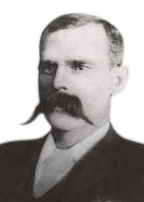Allan Wilson (army officer) facts for kids
Quick facts for kids
Allan Wilson
|
|
|---|---|
 |
|
| Born | 1856 Glen Urquhart, Scotland |
| Died | 4 December 1893 (aged 36–37) Shangani River, Rhodesia |
| Buried |
Matopos Hills, Rhodesia
|
| Allegiance | |
| Service/ |
|
| Years of service | 1877–1893 |
| Rank | Trooper Sergeant Major |
| Unit | Frontier Armed & Mounted Police Cape Mounted Rifles |
| Commands held | Victoria Column |
| Battles/wars | Xhosa Wars
|
| Awards | South Africa Medal British South Africa Company Medal |
Allan Wilson (born 1856 – died 4 December 1893) was a brave officer. He served in the Victoria Volunteers. He is famous for leading the Shangani Patrol during the First Matabele War. His heroic stand against many enemies made him a national hero in Britain and Rhodesia.
Contents
Who Was Allan Wilson?
Allan Wilson was born in Scotland in 1856. After finishing his training at a bank, he moved to the Cape Colony. This area is now part of modern-day South Africa. There, he joined the Cape Mounted Rifles.
Early Military Service
Wilson started his military career as a Trooper. He served in the Frontier Armed & Mounted Police. He fought in the Gaika-Galeka Campaign from 1877 to 1878. He also took part in the Morosi Campaign in 1879. For his service, he received the South Africa Medal.
Later, he joined the Cape Mounted Rifles and was promoted to Sergeant. After leaving the military, he worked as a trader and gold prospector. He then became an officer in the Basuto Police.
Joining the Victoria Volunteers
Wilson later joined the Bechuanaland Exploration Company. He became their Chief Inspector. He was sent to Fort Victoria (now Masvingo) in Matabeleland. There, he became a senior officer in the Victoria Volunteers. He reached the rank of Major.
The Shangani Patrol
When the First Matabele War began, Major Allan Wilson was given an important job. He took command of the Victoria Column. He led a group of soldiers known as the Shangani Patrol. Their mission was to find King Lobengula.
The Last Stand
On December 4, 1893, Wilson and 33 of his men were separated from their main group. They were surrounded by many Ndebele warriors. The Ndebele warriors were fighting fiercely.
Wilson sent three scouts, including Frederick Russell Burnham, to get help. But the main column was also in a tough battle. No help could reach Wilson and his men in time. All 34 men of the Shangani Patrol were killed.
A Hero's Burial
Allan Wilson and most of his patrol are buried in the Matabo Hills in Zimbabwe. He is buried near Cecil Rhodes. Wilson was seen as a national hero. He was considered one of the founding fathers of Rhodesia. The date of his death was even a national holiday in Rhodesia.
Wilson's Last Stand in Stories
The story of Allan Wilson's final battle became very famous. It was often told in plays, films, and books. It was seen as a brave stand against impossible odds. Many people compared it to Custer's Last Stand in American history.
Plays and Reenactments
In 1895, a patriotic play called Cheer, Boys, Cheer! was shown in London. It featured a dramatic scene called "Wilson's Last Stand." The play showed Wilson and his men fighting bravely. It said that Wilson was the last to fall. It also claimed the wounded men loaded rifles for him. When their ammunition ran out, the remaining men supposedly sang "God Save the Queen."
This scene was reenacted again in 1899 at the Greater Britain Exhibition in London. A play called Savage South Africa showed scenes from the Matabele wars.
Films and Books
A film based on the play, Major Wilson’s Last Stand, was made in 1899.
Later, in 1970, a docudrama film called Shangani Patrol was released. This film was based on a book called A Time To Die by Robert Cary. It starred Brian O'Shaughnessy as Major Allan Wilson.
 | Leon Lynch |
 | Milton P. Webster |
 | Ferdinand Smith |

